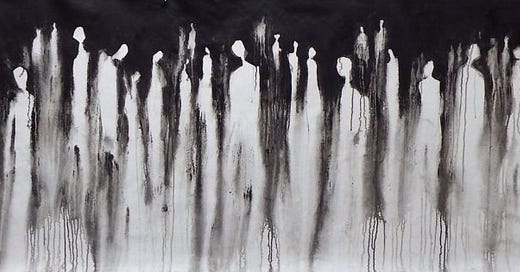The Lure of the Mob
Nobody holds to a belief that they knowingly acknowledge is wrong or inaccurate. Each belief has an emotional and identity-defining weight attached to it. For every incremental increase in resources (time, energy, money, relationships) spent on maintaining a belief, the greater the feeling of attachment and the less likely a person is ever to question the legitimacy of their claim. What area of life the belief connects to is incidental, what matters is the felt feeling of attached weight, the degree of importance a person places on it. This mounting pressure encourages us to bond together in groups, to spread the weight among the like-minded, this is the our of mob mentality.
A mob is any group of people holding to a particular belief or set of beliefs, with the primary purpose being abject support of said belief with a demand for purity. This support may masquerade at times under the guise of rational inquiry, with questions often in the form of conspiracy building, but it is the purity standard that makes it into a mob-mentality. The belief cannot be questioned and stands as the means to differentiate the 'true' from the 'false' believers.
While for some the immediate example of a cult comes to mind, mob behavior is not found only in religious groups, but is intrinsic to humanity. Political ideologies? Go to a rally and the lessening sense of individuation combined with an increase in emotional fervor will have you feeling larger than yourself. For that matter, many music concerts can encourage a similar feeling with rhythms of sound and body melting the barriers between self and other. In either situation, if you were to dare question what was going on, let there be no doubt you'd be met with varying degrees of anger and violence of one form or another.
A mob need not be a large group either. If you've ever met that couple utterly convinced of the rightness of their job venture or the sanctity of how they treat others despite chaos all around them, you know what abject support and purity looks like. Further, mobs are not constrained by physical proximity, as any social media messaging board or comment section can attest to.
"Individually and collectively, our very existence depends on our ability to reach accurate conclusions about the world around us." (Schulz, 2010, p.4) Unfortunately accuracy is as much a question of individual perception as it is about representing fully the myriad connections of reality. We search for information that supports the beliefs we already hold (confirmation bias) or to add other beliefs that support an overall worldview (internal coherence). Contrary to some who think bias is an act one consciously engages in, it is instead an inevitable and universal behavior. The question is not whether one is engaging in bias, it is the depth of one's awareness of doing so and desire/intent to mitigate it in some way.
A piece of information 'makes sense' or a new belief 'holds together' based on the emotional criteria of whether such aligns with a personal identity or felt sense of self. As stated previously, this weight can be overwhelming, particularly when faced with a broader reality of facts and people that either don't fit the worldview or are in vocal disagreement. The mob is a rescue from the uncertainty brought up by contrary information, a balm to the anxiety induced by skeptical inquiry.
Skepticism has two paths of discovery. The first is universal and exists alongside bias, where instead of focusing attention only on that evidence which is supportive, it draws the mind's eye to all that doesn't. The second is an active pursuit, a willful conscious deliberation upon what doesn't fit in one's beliefs, joined with a humility based on the long litany of historical protestations of having found truth only to be later chagrined at falling short.
Universal Skepticism is a form of psychological scientific method, parsing out the outliers in experience and shifting one's worldview to allow for growth and change. Willful Skepticism is far more rare and often, despite boasts to the contrary, little more powerful than the Universal. A significant factor in how far skepticism plows the field of beliefs is the depth of one's identification with the mob.
Remember that the mob is characterized by abject support and purity. If one looks around and sees in their friends, acquaintances, online communities, etc., little to no questioning of fundam
ental beliefs, then the mob is likely to be called home. If those who disagree are slandered, name-called, inferred or directly declared as being deficient in reason and intelligence, then it is the mob that one is part of. If one believes that their group is set against by the forces of the world in an US vs Them battle for the future of a family, community or nation, it is the mob that is being held close.
Skepticism, both Universal and Willful, is the exact opposite of mob mentality: believing that no single or set of beliefs is ever absent the potential for being inaccurate in whole or in part. The mob is not contrary to humanity any more than skeptical inquiry is, though most certainly they each strengthen different features and encourage different behavior. The kind of person and community grown will be determined by the resources placed in pursuit of one over the other. Mob mentality is a haven precisely because it is based on one of the greatest feelings in life: that of believing one is right.
References:
Schulz, Kathryn (2010-05-25). Being Wrong: Adventures in the Margin of Error. HarperCollins.





